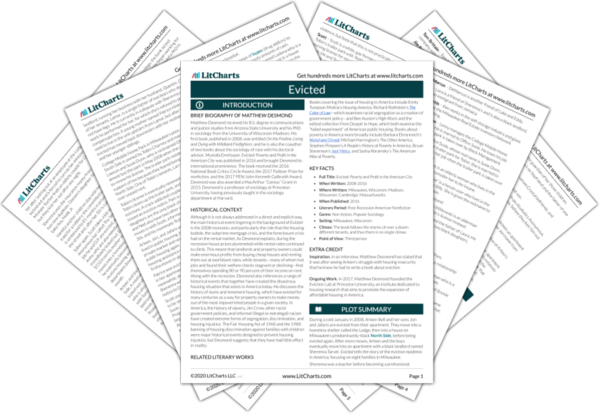Tobin Charney Quotes in Evicted
It took a certain skill to make a living off the city's poorest trailer park, a certain kind of initiative. Tobin’s strategy was simple. He would walk right up to a drug addict or a metal scrapper or a disabled grandmother and say, "I want my money." He would pound on the door until a tenant answered. It was almost impossible to hide the fact that you were home. It was hard to hide much of anything. Office Susie knew when your check arrived; she put it in your mailbox. And Lenny could plainly see if you had enough money to buy cigarettes or beer or a new bike for your kid but not enough to pay the rent.
You've got to wonder if the street people don't have the right idea. Just live on the street. Don't have to pay rent to nobody.
When city or state officials pressured landlords—by ordering them to hire an outside security firm or by having a building inspector scrutinize their property—landlords often passed the pressure on to their tenants. There was also the matter of reestablishing control. The most effective way to assert, or reassert, ownership of land was to force people from it.
Some landlords neglected to screen tenants for the same reason payday lenders offered unsecured, high-interest loans to families with unpaid debt or lousy credit; for the same reason that the subprime industry gave mortgages to people who could not afford them; for the same reason Rent-A-Center allowed you to take home a new Hisense air conditioner or Klaussner “Lazarus” reclining sofa without running a credit check. There was a business model at the bottom of every market.
But for the most part, tenants had a high tolerance for inequality. They spent little time questioning the wide gulf separating their poverty from Tobin's wealth or asking why rent for a worn-out aluminum-wrapped trailer took such a large chunk of their income. Their focus was on smaller, more tangible problems […] Most renters in Milwaukee thought highly of their landlord. Who had time to protest inequality when you were trying to get the rotten spot in your floorboard patched before your daughter put her foot through it again? Who cared what the landlord was making as long as he was willing to work with you until you got back on your feet? There was always something worse than the trailer park, always room to drop lower.

Tobin Charney Quotes in Evicted
It took a certain skill to make a living off the city's poorest trailer park, a certain kind of initiative. Tobin’s strategy was simple. He would walk right up to a drug addict or a metal scrapper or a disabled grandmother and say, "I want my money." He would pound on the door until a tenant answered. It was almost impossible to hide the fact that you were home. It was hard to hide much of anything. Office Susie knew when your check arrived; she put it in your mailbox. And Lenny could plainly see if you had enough money to buy cigarettes or beer or a new bike for your kid but not enough to pay the rent.
You've got to wonder if the street people don't have the right idea. Just live on the street. Don't have to pay rent to nobody.
When city or state officials pressured landlords—by ordering them to hire an outside security firm or by having a building inspector scrutinize their property—landlords often passed the pressure on to their tenants. There was also the matter of reestablishing control. The most effective way to assert, or reassert, ownership of land was to force people from it.
Some landlords neglected to screen tenants for the same reason payday lenders offered unsecured, high-interest loans to families with unpaid debt or lousy credit; for the same reason that the subprime industry gave mortgages to people who could not afford them; for the same reason Rent-A-Center allowed you to take home a new Hisense air conditioner or Klaussner “Lazarus” reclining sofa without running a credit check. There was a business model at the bottom of every market.
But for the most part, tenants had a high tolerance for inequality. They spent little time questioning the wide gulf separating their poverty from Tobin's wealth or asking why rent for a worn-out aluminum-wrapped trailer took such a large chunk of their income. Their focus was on smaller, more tangible problems […] Most renters in Milwaukee thought highly of their landlord. Who had time to protest inequality when you were trying to get the rotten spot in your floorboard patched before your daughter put her foot through it again? Who cared what the landlord was making as long as he was willing to work with you until you got back on your feet? There was always something worse than the trailer park, always room to drop lower.











